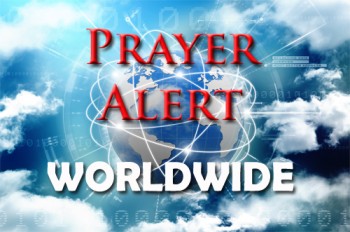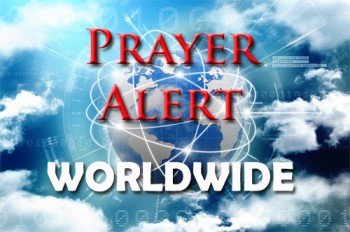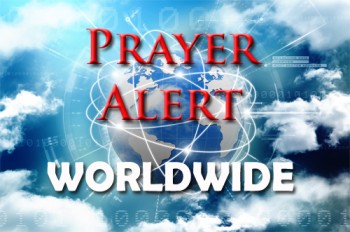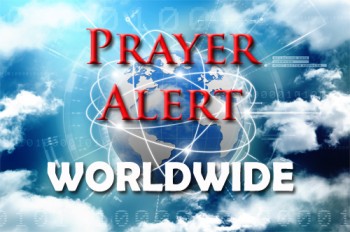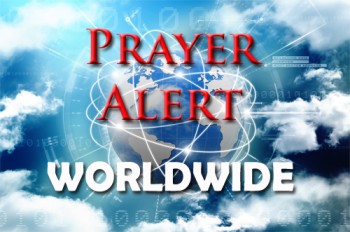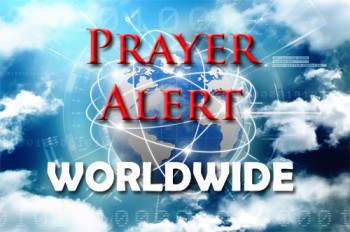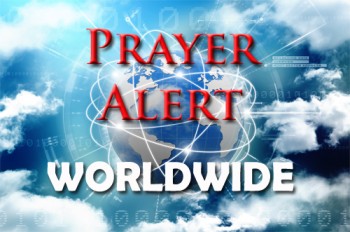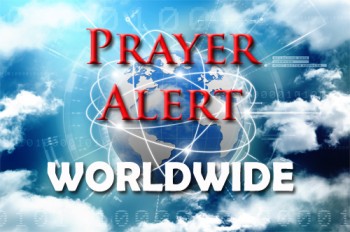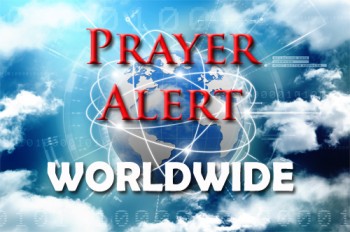Displaying items by tag: Africa
Mozambique: persecuted man chose Christ
Kidnapping Christians is a tactic frequently used by the jihadists who have been waging an insurgency in Mozambique since 2017. The UN said at least 2,600 people have been killed and more than 700,000 made homeless. Even nuns have been taken hostage. Reports emerge of a Christian man in Mozambique who risked his life by refusing to convert to Islam after extremists seized him and held him captive in the bush. Father Kwiriwi Fonseca said, ‘We met a Christian who was asked “Do you want to stay here and become Muslim, or do you want to go home?” It is risky as some people who say they want to go home are slaughtered on the spot. He thought he would be killed but he said it is better to go home. The men decided he could go home; it is very mysterious.’
South Africa: Olympic athlete gives glory to God
Tatjana Schoenmaker set a new record in the women’s 200-metre breaststroke, and she is using her success to point others to God. After breaking another record in the preliminary rounds for the 100-metre breaststroke, she ended up claiming the silver medal. In all her competitions in Tokyo, Tatjana has worn under her green South Africa swim cap another cap proclaiming her faith with a blue Jesus fish and the phrase ‘Soli Deo Gloria,’ meaning ‘Glory to God alone,’ printed on the side of it. She has used her platform to discuss her Christian faith before the Olympics began in an Instagram post, ‘Father God, may Your will be done, may Your peace fill us up, may we praise You no matter what the outcome, may we be empowered by Your strength to give our all and may we forever be in awe of Your goodness!’ she wrote. ‘Thank You for bringing us to this very moment.’
Tunisia: the road to democracy
With the first steps towards a democratic government in 2019, Tunisians hoped their political institutions and politicians would respond to the needs of the population. The Arab Spring called its leaders to account, looking for diversity and accountability. President Kais Saied was elected. They wanted democracy, but it takes time. On 25 July, after nationwide violent protests over economic and social turmoil and the government's poor handling of Covid cases, Tunisia's president sacked the prime minister and suspended parliament. When Saied announced he was taking over, opponents immediately accused him of staging a coup. Sadly, Arab Spring has not led to a stable economy or politics. Saied said he took these decisions ‘until social peace returns and we save the state.’ He vowed to respond to further violence with military force.
South Africa: the spiritual battle
Many believe that what we see in South Africa is the physical manifestation of what is happening in the spiritual realm. A spiritual battle is raging across South Africa, and it is manifested through riots, arson, gang violence, taxi violence, farm murders, etc. When confronted with recent scenes we must guard our hearts and minds against looking at it purely from a physical perspective. Mr Zuma’s imprisonment represents the progress made in the fight against corruption within the country. Amid the many challenges SA faces, it is easy to lose sight of the good, and positive things that are happening. In 3 ½ years SA has seen the evidence of corruption and specifically ‘state capture’ being brought to light. This would never have happened, had it not been for a mighty movement by God’s Spirit, in conjunction with many prayers. The devil would not be happy about it and is heating up the battle to ‘turn the tide’.
Equatorial Guinea: kleptocracy
Revelations by courageous investigative journalists reveal kleptocracy in Equatorial Guinea. A recent cross-border investigation exposed how Gabriel Mbega Obiang Lima - the President’s son, and the country’s oil minister - may have siphoned off millions in state funds and bribes abroad. Journalists tracked down an international web of shell companies and properties linked to him, including a Cyprus company and its subsidiaries in other countries. Another corruption investigation, released this week, implicates two more individuals related to the Obiangs who run Equatorial Guinea's state oil company. Journalists discovered the oil industry power couple had luxury properties around the world that even their hefty pay packages cannot explain. In Cyprus they purchased a €2.5 million villa to obtain golden EU passports. The international community needs to make it much more difficult, and eventually impossible, for the kleptocrats to enjoy the proceeds of their crimes, deterring them from stealing from their people in the first place.
South Africa: looting and civil unrest
The following is from a report made with the help of seven pastors and a bishop in South Africa: ‘Please pray against a spirit of violence and disruption threatening the country’s peace and stability following the jailing of former president Jacob Zuma last week. The root of the ongoing situation is criminal rather than political. KwaZulu Natal and Gauteng provinces are hotspots of riots and looting sprees, and it may spread to other regions. 45 people have died and 757+ arrested in 5 days. Forces fire rubber bullets and live ammunition to deter Johannesburg looters, Durban has unrest and shootings. Shops, businesses, schools and farms are looted and destroyed. Road traffic is attacked and they are on the crest of a third Covid wave. It is believed that this is a backlash to a lot of evil and corruption being exposed over the past year as well as Kingdom breakthroughs. Pray for South Africa to step into her prophetic destiny, with peace on every street.’
South Sudan: churches write to leaders
The Archbishop of Canterbury, Pope Francis, and Church of Scotland moderator Jim Wallace have written to South Sudan's political leaders on the tenth anniversary of its independence. They said that the anniversary calls to mind past struggles and points with hope to the future, and that the nation is blessed with immense potential. They encouraged leaders to make even greater efforts to enable their people to enjoy the full fruits of independence. They also said, ‘When we wrote to you at Christmas, we prayed that you might experience greater trust among yourselves and be more generous in service to your people. Since then, we are glad to see some small progress. Sadly, your people continue to live in fear and uncertainty, and lack confidence that their nation can indeed deliver the “justice, liberty and prosperity” celebrated in your national anthem. Much more needs to be done to shape a nation that reflects God’s kingdom.’
Ethiopia: Eritrean soldiers destroy refugee camps
For months, Ethiopia’s civil war has raged in Tigray, demolishing infrastructure and threatening famine. Despite talks of ceasefire, no end to the violence is in sight. Most concerning is the involvement of Eritrean soldiers in the conflict. Pastor Eric Foley says they have destroyed two refugee camps in the Tigray region. ‘They took people who had escaped from Eritrea and were living in the camps back to Eritrea and imprisoned them. Those who escaped the raids fled further into Ethiopia. The Tigray Church is a beacon during all this chaos. People are gathering in churches, grieving at the churches, bringing dead bodies to churchyards to bury them in mass graves. The Gospel is still making a way for people to have hope. The Christians are opening their homes and doing all the things that Jesus taught us to do.’
Nigeria: Naomi’s story
Naomi, a Nigerian Christian widow, never expected to suffer persecution, but when her town was overrun by Islamists, she was ready. Her Bible had taught her, ‘Persecution is God’s Word being fulfilled.’ While Naomi was working her farmland outside the city she heard distant gunfire. She immediately ran toward the sound, concerned for her children at home. After passing scenes of horrific violence on her way she gathered her children and fled to nearby mountains, where they stayed before moving to a Cameroon refugee camp. Poor conditions there forced them to return to Nigeria. When mission workers learned of her situation, they helped the family move into their own home and arranged for the children to attend a good school. Naomi said, ‘Attacks made my faith stronger.’
Central Africa Republic: prayer
While the 2019 peace agreement signed in the CAR was a step forward, it has not yet been fully implemented, as militia attacks continued to occur. Pray for meaningful dialogue between state and non-state armed participants that would enable the agreement to succeed. The Chinese, the Russians, the UN peacekeeping forces (MINUSCA), the rebels, and the political authorities are all out to plunder what they can of the mineral riches of the country. The people have eyes only to weep. When will this nightmare ever come to an end? Pray that peace, stability and justice will come soon, for the sake of the civilians who continue to suffer immensely. Although a special criminal court was set up in 2015 to investigate and prosecute grave human rights violations, it lacks funding : so countless victims of violence are waiting for justice. Pray that the court will be fully financed, so that all perpetrators are held to account.
